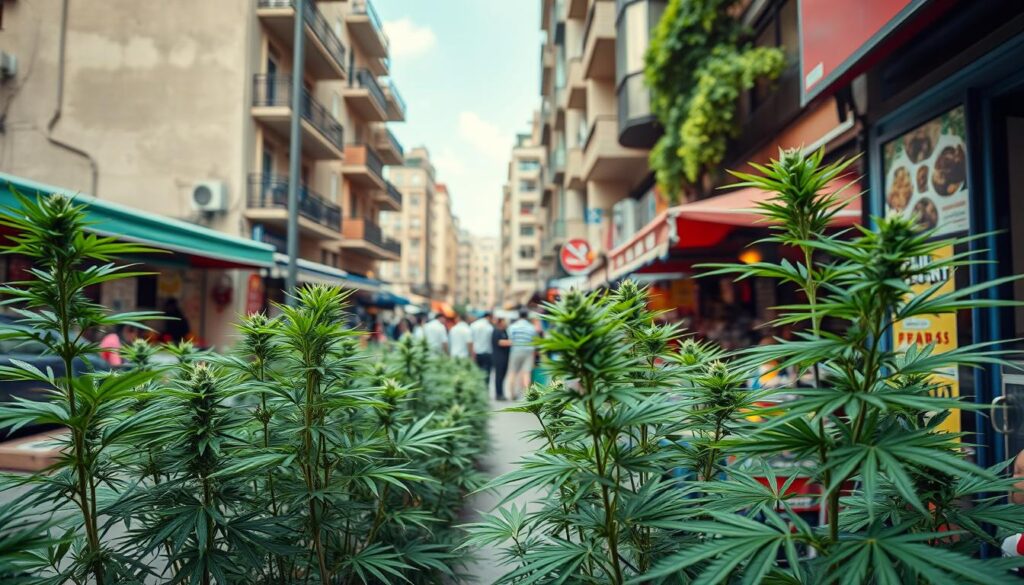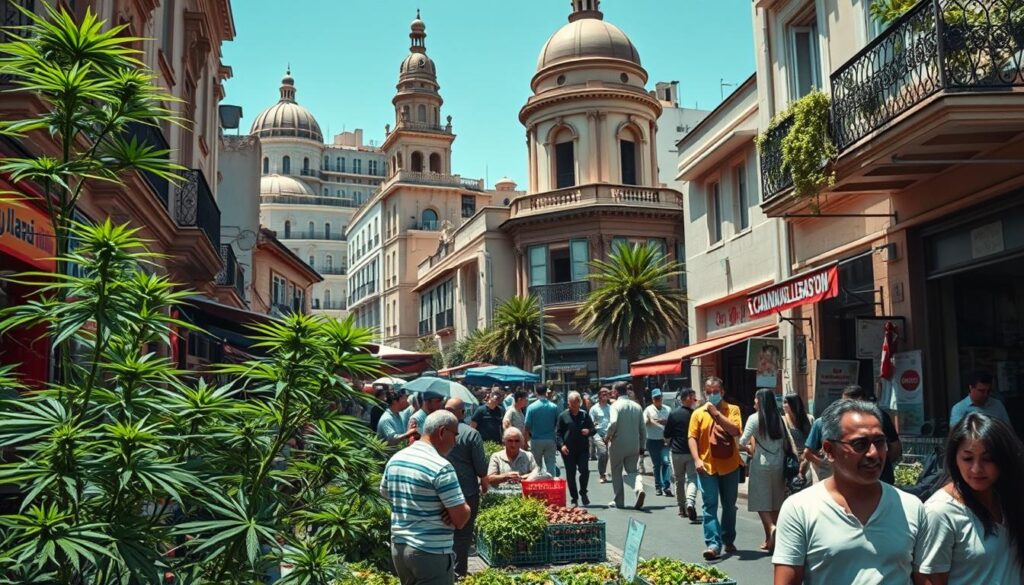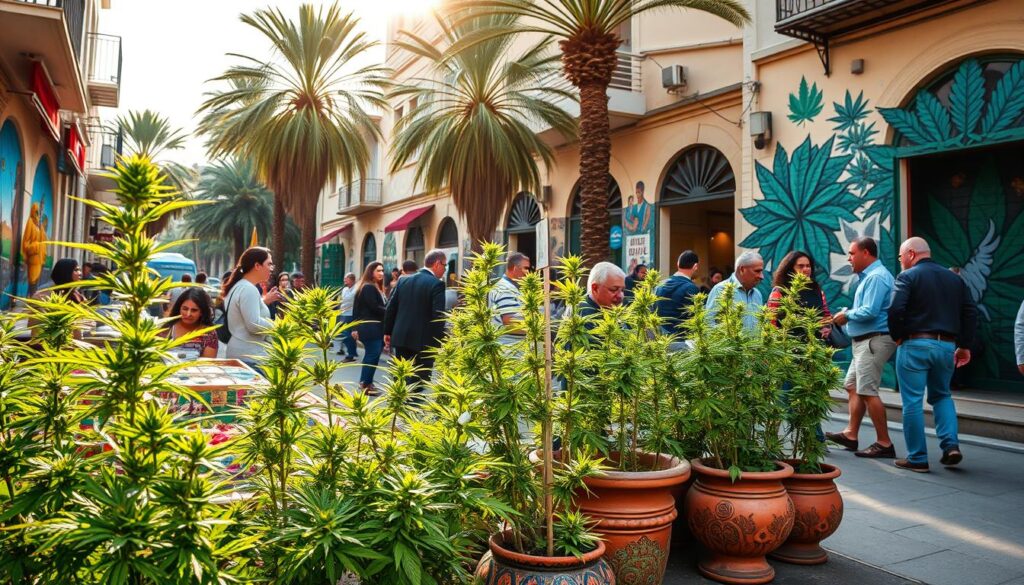Lebanon’s cannabis culture is complex and interesting. Beirut is at the center of changing views on marijuana in the Middle East. The Bekaa Valley has long been a key place for growing cannabis.
Weed in Beirut is more than just a drug. It’s a big part of the culture and farming traditions. Lebanon’s connection to cannabis is rich and varied, from old farming ways to possible medical use.
To really understand Lebanon’s cannabis scene, you need to look beyond simple ideas. It’s about the social, economic, and legal sides of cannabis in the country. Exploring Lebanon’s cannabis world will open your eyes.
Key Takeaways
- Lebanon has a century-long history of cannabis cultivation
- The Bekaa Valley is a primary cannabis production region
- Medical cannabis legalization is an emerging possibility
- Economic potential exists in regulated cannabis markets
- Cultural attitudes toward cannabis are complex and evolving
Historical Background of weed in Beirut
Cannabis has been a big part of Lebanon’s culture for thousands of years. It’s tied to farming, making money, and changing drug laws in Arab countries.
The Phoenicians, known for their sailing, helped spread cannabis across the Mediterranean. They were among the first to see its many uses.
Ancient Cannabis Traditions
Lebanon’s history with weed in Beirut is full of interesting stories:
- Early farmers grew it in places like the Bekaa Valley.
- They used it for medicine and other needs.
- It was important for more than just money.
Evolution Through Different Empires weed in Beirut
Many empires have shaped Lebanon’s cannabis world:
| Empire | Cannabis Influence |
|---|---|
| Ottoman Empire | They tried to control it but people kept growing it. |
| Byzantine Period | They made it a big part of farming and trade. |
| Roman Era | They helped improve how it was grown. |
Modern Era Development
In the late 1900s, Lebanon became a big player in growing cannabis. During the civil war, farmers in the Bekaa Valley grew most of the world’s cannabis. This changed their economy a lot.
*”weed in Beirut cultivation became a survival strategy for thousands of Lebanese families”*
The government’s view on cannabis has changed a lot. In 2020, Lebanon was the first Arabic country to let people grow cannabis for medicine and other uses. This was a big step in changing drug laws in the area.
The Bekaa Valley: Lebanon’s weed Heartland
The Bekaa Valley is in Lebanon’s heart. It’s famous for weed and hash smuggling. This area has changed the local economy and society for many years.
Farming cannabis in the Bekaa Valley is a story of survival. Lebanon is the third-largest cannabis producer, with the Bekaa Valley leading. Farmers make more money from cannabis than from other crops.
“In the Bekaa Valley, cannabis isn’t just a crop – it’s a lifeline for thousands of farmers,” says a local agricultural expert.
- Over 40,000 arrest warrants exist in the region, many drug-related
- Cannabis production surged after Syria’s 2011 civil war
- Estimated annual production value during civil war: $500 million
| Crop Comparison | Production Cost | Economic Return |
|---|---|---|
| Potatoes | High | Low |
| Cannabis | Low | High |
Cannabis farming in the Bekaa Valley is very profitable. Farmers earn much more than with other crops. The region’s location and climate make it key for cannabis production.
The Bekaa Valley shows how farming can change lives. It’s a place of innovation and survival in tough times.
Understanding Weed in Beirut: Local Perspectives
Lebanon’s cannabis culture is complex. It involves social, economic, and cultural aspects. People see cannabis as more than just a plant. It’s tied to traditions and survival.
Cultural Attitudes
In Beirut, views on cannabis are mixed. Some see it as a way to make money. Others think it could be used for medicine and industry. Lebanon’s laws on cannabis are strict, but it’s trying to change.
- Traditional view: Economic survival crop
- Modern perspective: Potential medical and industrial opportunity
- Growing acceptance of regulated cannabis production
Social Impact
Cannabis growing in Lebanon affects society. Farmers in the Bekaa Valley depend on it. They call it their “green petroleum“. This ties the community to cannabis.
“weed in Beirut is more than a crop; it’s our economic backbone” – Local Bekaa Valley Farmer
Economic Significance
| Economic Aspect | Potential Impact |
|---|---|
| Potential Government Revenue | Up to $1 Billion |
| Current Cultivation Status | Widespread in Bekaa Valley |
| Potential Medical Market | Growing International Interest |
Cannabis could be very good for Lebanon’s economy. With new discoveries and more people using it for health, Lebanon has a chance. Legalizing it could help farmers and bring in a lot of money.
Lebanon’s weed Law Reform and Medical Legalization

In 2020, Lebanon became the first Arab country to allow growing cannabis for medical and industrial use. This big change in drug policy in the Middle East was a major step forward.
The new Law No. 178/2020 changed how Lebanon views cannabis. It made a legal way to grow it. This law lets for many cannabis products, like:
- Medical pharmaceutical compounds
- Industrial fibers
- Cosmetic products
- Therapeutic extracts and oils
A new group, the Regulatory Authority for Cannabis Cultivation, was set up to watch over this new field. Even though it’s legal, you still can’t use cannabis for fun. This shows how Arab countries handle drug policy carefully.
“Lebanon’s cannabis legalization represents a strategic economic opportunity during challenging times” – Cannabis Industry Expert
This move was made during tough times and the COVID-19 pandemic. It shows Lebanon’s creative way to grow its economy. Farmers in places like the Bekaa Valley can now grow cannabis legally. This could change farming and bring new jobs.
Studies also back this change. They show cannabis can help with things like epilepsy, multiple sclerosis, and side effects from chemotherapy.
From Hashish to Wine: Agricultural Transformation
Lebanon’s farms have changed a lot. They used to grow cannabis but now make wine. The Bekaa Valley, famous for cannabis, is now leading a new farming era.
Switching from growing cannabis to grapes is big. It’s not just about money. It’s about finding new ways to farm.
Traditional Farming Methods
Farmers in the Bekaa Valley used to grow cannabis. They knew how to farm well. Now, they grow grapes, showing they can adapt easily.
- Cannabis used to be a big export
- Farmers knew a lot about growing things
- They used their knowledge to grow grapes
Current Cultivation Practices
Today, Lebanese vineyards are big players in the economy. The Couvent Rouge cooperative has 250 farmers. They grow grapes and make wine that wins awards worldwide.
“Our farmers are not just growing grapes—they’re cultivating a new national identity” – Lebanese Agricultural Expert
Economic Impact on Farmers
Wine making is good for farmers’ pockets. It can make more money than cannabis. Lebanese wineries make 8-9 million bottles a year. This brings in a lot of money for farmers.
| Winery | Annual Production | Export Countries |
|---|---|---|
| Chateau Kefraya | 1.4 million bottles | Multiple European markets |
| Coteaux du Liban | 70,000 bottles | 11 countries |
This change shows how farmers in Lebanon can adjust and do well. They show they can handle new challenges.
The Economic Potential of Lebanon’s Cannabis Industry
Lebanon is at a key moment in its cannabis industry. It’s seeing big chances in marijuana laws in the Middle East. The country could change its cannabis sector a lot. This could make big changes in farming and medicine.
The economic chances are big. Recent studies show how cannabis could affect the economy:
- Estimated annual revenue potential: $4 billion USD
- Projected cannabis cultivation increase: Zero hectares in 2017 to 1,000 hectares by 2025
- Current global cannabis supply contribution: 6% worldwide
Lebanon is leading in cannabis legalization in Arab countries. The government is making a strong plan. They want to control growing, making, and selling cannabis products well.
“Lebanon could become a significant player in the global medical cannabis market” – Economic Development Expert
There are many economic chances:
- Medical cannabis production
- Pharmaceutical research
- Export of cannabis-derived products
- Agricultural transformation
Investors from Canada and China are interested in Lebanon’s cannabis. The country’s good location and farming history help make top-quality cannabis.
Cannabis Production Zones and Regional Dynamics
The world of weed in Beirut and Lebanon’s cannabis industry is complex. It has many production zones that have shaped the area’s farming and economy. The Bekaa Valley is key to hash smuggling in the Mediterranean.
Major Growing Areas
The Bekaa Valley is Lebanon’s main place for growing cannabis. It’s important to know a few things about this area:
- Concentrated cultivation in specific villages
- Historically organized farming techniques
- Regions spanning from Bcharre to Baalbek
Distribution Networks
Cannabis distribution has changed over time. During the civil war, militias controlled the hash smuggling routes. Today, the networks have become more regulated. The government is working to make cannabis production legal for medical and industrial use.
Local Control Systems
Local control of cannabis production is a balance between:
- Traditional farming communities
- Political factions
- Emerging legal regulatory bodies
“Cannabis farming is more than an economic activity; it’s a survival strategy for many farmers in the Bekaa Valley.”
As Lebanon moves towards legalization, the cannabis industry could be a big help to farmers. It could bring in up to $1 billion a year. This change from illegal to legal industry is a big deal for the area’s farming and economy.
International Relations and Drug Policy

Lebanon’s cannabis industry has changed its international relations a lot. It has made the country’s economy and diplomacy very complex. The country’s marijuana laws in the Middle East have changed a lot, especially because of global politics.
In the 1990s, the US put a lot of pressure on Lebanon. This led to big changes in the country’s drug policies. The Clinton administration pushed for eradicating cannabis. This effort helped Lebanon get off a list of countries involved in drug trafficking in 1997.
This shows how hard it is to change drug policies in Arab countries. You can read more about this at this link.
“Cannabis has been more than a crop—it’s been a geopolitical negotiation tool for Lebanon.”
Lebanon makes a lot of money from cannabis. They produce over 4 million pounds of hashish every year. This brings in profits of over US$4 billion. Most of this is sold outside of Lebanon, showing how big the industry is.
- 75% of global hashish consumption originates from Lebanon
- Nearly 2,500 pounds of Lebanese heroin enter US markets yearly
- Drug industry contributes over half of foreign-exchange earnings
In April 2020, Lebanon made a big change. They legalized growing cannabis with less than 1% THC for medical and industrial use. This change could open up new chances for diplomacy and economy.
Lebanon’s way of handling cannabis shows how laws in the Middle East are changing. They are trying to meet international standards while also helping their economy. Lebanon is showing it can lead in agriculture and medicine in the Arab world.
Current Challenges in the Lebanese weed in Beirut
The weed in Beirut faces big challenges. The cannabis industry in Lebanon is at a turning point. It must mix old farming ways with new business chances.
- Transitioning traditional farmers from illegal to legal cultivation
- Developing robust regulatory frameworks
- Creating export infrastructure for medical cannabis
- Competing in the global medical cannabis market
The Bekaa Valley, once a big cannabis producer, needs big changes. Farmers used to grow in secret. Now, they must follow strict laws and join the official market.
“The cannabis landscape in Lebanon represents both an economic challenge and an opportunity for agricultural reinvention.” – Regional Economic Expert
Big challenges include:
- Low production costs of existing illegal cultivation networks
- Limited infrastructure for medical cannabis production
- Complex regional political dynamics
| Challenge Area | Current Status | Potential Solution |
|---|---|---|
| Legal Framework | Emerging Regulations | Comprehensive Policy Development |
| Agricultural Transition | Informal to Formal Sector | Training and Economic Incentives |
| Market Competition | Limited Global Presence | International Partnership Development |
The future of cannabis culture in Lebanon depends on strategic approaches that balance economic needs, legal requirements, and global market opportunities.
Future Prospects for Cannabis Reform
Lebanon is at a key moment in its marijuana laws. The country is ready to change its economy with new cannabis policies. Legalizing medicinal cannabis in 2020 was a big step. It made Lebanon a leader in drug policy reform in Arab countries.
The future of cannabis in Lebanon is full of chances and challenges. Experts say the industry could grow a lot. This could change the economy a lot.
Policy Development Strategies
Creating a strong rule set is key for cannabis reform. Important steps include:
- Creating comprehensive licensing mechanisms
- Establishing strict quality control standards
- Implementing transparent monitoring systems
- Developing international compliance protocols
Industry Growth Potential
Lebanon’s cannabis industry has a lot of promise. The Global Industrial Hemp Market is expected to hit $17.24 billion by 2030. Lebanon could take a big part of this market.
International Market Access
Getting into global markets needs careful planning. Lebanon must use its unique growing skills while following international rules. The former Lebanese economy minister said medical cannabis could bring in $1 billion a year.
“Our cannabis reform is more than an economic chance—it’s a way to change Lebanon’s farming and medicine.” – Cannabis Policy Expert
But, there are big challenges. Lebanon must deal with tough international trade rules and strong competitors. Success will depend on Lebanon’s smart and clear cannabis rules.
Conclusion
The world of weed in Lebanon is at a big turning point. You need to understand the marijuana laws in the Middle East. This is because Lebanon has just started to allow medical and industrial cannabis.
Lebanon’s cannabis industry has a long history in the Bekaa Valley. It offers both chances and challenges. The country’s rich farming background is a great start for a cannabis market.
But, there are still big challenges ahead. Lebanon needs to make good laws and compete globally. It must use local knowledge and follow international rules.
Lebanon can grow a lot if it works together. Policymakers, farmers, and others must team up. This way, Lebanon can become a big player in the cannabis world.

I Was looking for weed and i came across Zeus weed recommended by a friend . Zeus is super friendly, making it easy to get cannabis products. The delivery service is reliable with professional riders ensuring timely arrivals.
The quality of their products is top-notch, and their customer service is attentive and knowledgeable, offering helpful recommendations. Highly recommended for anyone seeking convenience, quality, and professionalism.
Contact him on his telegram link telegram : t.me/alphakushOG
Contact him email : alphakushog@gmail.com
Note:
He accept only btc/usdt and do not take cash payment and also he do not have telegram channel so dont contact any one on telegram channel.
Thanks bro, we ordered from him for the first time and couldn’t have been happier. They were willing to drive all the way out to my hotel as fast as possible . They were very helpful when we had a bunch of questions on the strains. We used both the telegram app and text them directly . Prices are extremely reasonable – cheaper than where we were ordering from for years. They also have the strongest cannabis we’ve seen being sold – which my wife needs for medical reasons.
Will definitely be ordering from Zeus weed again.
Excellent Customer Service!!
It’s so great to speak with nice humans that care about their customers. Every order I’ve made has been 100%.
I will absolutely continue to purchase from Zeus Weed.
Zeus Weed is what made my experience great! He was kind to me and patient and answered all my questions. I loved everything about the experience. Highly recommend!
email them.. alphakushog@gmail.com
Ordering was effortless. The delivery time was faster than expected, and the delivery guy called me to coordinate the pick up spot and was very respectful. The only problem is that i have to send bitcoin which i am not not use to it .